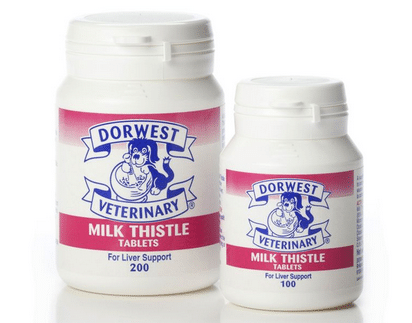
What are the health benefits of milk thistle for dogs? What is the best brand of milk thistle for dogs with kidney failure, liver disease, epilepsy and other canine problems? Milk thistle is a flowering herbal plant with lots of benefits for canine health.
Known to cleanse your dog and get rid of toxins, this plant has a range of health benefits and has been used to cure a number of canine diseases. In this article, find out how you can use milk thistle for dogs including the dosage, the best brand, and its side effects. Also, learn more about how you can use it as a natural supplement for healthy dogs.
Contents
Is Milk Thistle Good for Dogs?
What is milk thistle? Milk thistle, also known as silymarin, is a flowering plant related to the daisy and ragweed family. It is native in the Mediterranean countries. Other names used to refer to this plant include Mary thistle and Holy Thistle. The main active ingredient Silymarin is both an anti-inflammatory and antioxidant.
Several studies done suggest that the substances present in milk thistle especially silymarin can protect dog’s liver from toxins which can cause liver damage- it helps the liver regenerate with new cell growth after the damage has occurred.
Other than being used as a remedy for other diseases, milk thistle can also be used as a natural supplement for healthy dogs. There have been suggestions that it can even reduce the initiation and progression of various types of cancer.
Is milk thistle bad for dogs? While most studies are not conclusive, its use since ancient times has been very promising. When used correctly and in the right doseage, milk thistle is very safe for use in dogs.
Benefits of Milk Thistle
Milk thistle is one of the few herbs that is scientifically accepted to have significant medicinal value for both humans and canines. Most milk thistle extracts contain about 80% of the active ingredient silymarin which is a flavonoid. It is also a potent antioxidant that supports the dog’s immune system from the damaging action of free radicals.
While milk thistle is known to have a wide range of benefits for canines, it is actually recommended to reserve its use for treatment of existing disease. Some studies show that long-term use of high doses of milk thistle can be damaging to the liver. Here are some of the known health benefits of milk thistle for dogs:
Milk Thistle for Liver Disease
Various studies done to show that milk thistle is beneficial to dogs with liver disease. Supplements with milk thistle which has strong antioxidant properties can help dogs with liver problems such as fatty liver disease, jaundice and hepatitis, and cirrhosis.

While you are at it, note that it is important to know why your dog has elevated liver enzymes and showing signs of liver inflammation before you begin self-treatment. Giving high levels of milk thistle to dogs with liver problems could actually be detrimental. Silymarin can also be used to restore liver function in humans and cats.
How does milk thistle help with liver disease? Other than neutralizing free radicals, ingredients silymarin and silybin stabilize liver membranes, increase the level of functional liver enzymes and regenerate new liver cells to replace the damaged ones. It is also very useful when used for canine liver support during chemotherapy for liver cancer and dogs with liver shunts.
Milk Thistle Dosage for Dogs with Liver Problems
To administer Liquid milk thistle for dogs with liver disease, give one drop for every 0.5kg of body weight up to 22kg. Add one drop per additional kg above 22kg.
Milk Thistle for Kidney Failure
Milk thistle has been found to reduce the time it takes for your dog to heal from kidney damage. Milk thistle with EPA and DHA for dogs is a natural supplement that has been formulated to provide support for dogs with kidney and liver failure.
It promotes kidney function, maintains excretion of waste products and provides support for the optimum performance of the urinary system by converting vitamin D to its active form- great remedy for dogs with incontinence. Milk thistle supports water balance fluid regulation. Other related functions include improving functions of the gallbladder and alleviate symptoms of pancreatitis.
Dogs Allergies
Milk thistle has also been found to be very effective in treating skin conditions such as dermatitis and seasonal allergies.
Canine Epilepsy
Seizures are not as common in dogs and cats without an underlying problem like brain disease or tumors. Other rarer causes include infections such as toxoplasmosis, kidney disease, and peritonitis. Milk thistle is some given in dogs on anti-seizure medication to support liver and kidney functions since most of these medicines are excreted via the kidney or the liver.
For a liver cleansing dosage, it is advisable to give milk thistle while lowering the phenobarbital or any other anti-seizure meds. This should only be done by your dog’s vet.
Other canine problems that can benefit from supplementation with milk thistle include:
- Anemia
- Diarrhea
- Cataracts
- Arthritis
Milk Thistle Dosage for Dogs
How much milk thistle should I give my dog? How much milk thistle is safe for dogs? Milk thistle dosage for dogs is based on the silymarin content. Since supplements contain a different amount silymarin: anywhere between 50-500mgs, it is advisable to buy milk thistle derivative rather than a silymarin only.
Usually, the recommended milk thistle extract contains 70-80 % silymarin. Make sure that each extract you buy has the silymarin content or percentage labeled out correctly.
When giving tincture, administer a starting dose of a ¼ teaspoon per 20lbs of your dog’s body weight per day. This should be given in 4 divided doses. When using the powder formulation, administer 2-5mg per 1lb of your dog’s body weight in 2 or 3 times per day.
The amount given to dogs also depends on the reason why you are giving milk thistle to your dog. Having in mind that milk thistle is considered generally safe for dogs, in treatment of liver problems, daily doses per body weight are increased. For other canine problems, a third or one half of that dose is more than adequate.
Here are the recommended milk thistle dose for dogs according to the newsletter for healthy pets;
| Dog’s size | Dose % of adult human dose |
| 5lbs | 10% |
| 5-10lbs | 15% |
| 11-20lbs | 20% |
| 21-40lbs | 30% |
| 41-70lbs | 50% |
| 71-100lbs | 75% |
| 100lbs | 100% |
It is always important to read the label and go through the list of contents carefully. While it is considered generally safe for dogs, it is always important to consult your vet before administering milk thistle to your dog for any reason.
Liquid Milk Thistle
Milk thistle for dogs also available in liquid form is native to the southern UK but has been naturalized in parts of America and Australia. It gets its name from the milky white liquid that comes from its leaves when crushed.

Unlike the human formulations which come with a bit of alcohol, if you choose to give liquid milk thistle to your dog, make sure you get one that is specifically alcohol-free and intended for canine use.
Liquid milk thistle is glycerin based, alcohol-free with no side effects on pets. It is easy to administer in liquid drops with no known side effects.
Liquid milk thistle for dogs’ ingredients includes Silybum marianum 333mg per ml (20 drops/ml), deionized water, natural bacon flavor and vegetable glycerin.
Liquid Milk Thistle Dosage
Administer orally once daily. Give one drop for every 0.5kg of body weight up to 22kg. Above 22kgs, add one drop per kg. Shake well before use. DO NOT refrigerate.
Where to Buy Milk Thistle for Dogs
Where can I buy milk thistle? Milk thistle for dogs for sale is readily available at local food and general stores like Walgreens. You can also order from online retailers such as Amazon. The only problem, however, is that OTC milk thistle is often sold in capsule form which is not great for canine use.